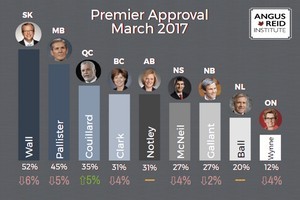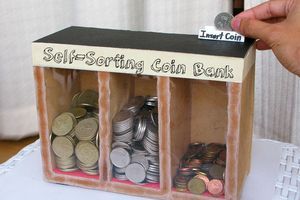Local entrepreneur envisions Wynne win
 A five minute conversation with the average Ontario voter will reveal one irrefutable fact: Premier Kathleen Wynne is about as popular as a fart in an elevator and about as welcome as a porcupine in a nudist colony. With an overall approval rating reported in the media somewhere between 8 and 12 per cent, Rex Murphy has provided one of the best assessments of Wynne's popularity: she is only "slightly more popular than traffic tickets and overcooked broccoli".
A five minute conversation with the average Ontario voter will reveal one irrefutable fact: Premier Kathleen Wynne is about as popular as a fart in an elevator and about as welcome as a porcupine in a nudist colony. With an overall approval rating reported in the media somewhere between 8 and 12 per cent, Rex Murphy has provided one of the best assessments of Wynne's popularity: she is only "slightly more popular than traffic tickets and overcooked broccoli".
Of course all the pundits (and in this instance they're probably correct) attribute Wynne's dismal popularity to a single issue: the mismanagement of Ontario electricity. In an effort to bolster the government's political future, the Liberals have taken two steps to address skyrocketing electricity bills. First, they've eliminated the provincial portion of the HST applied to electricity bills which amounts to an overall 8% reduction on customers' monthly bills. And second, they've shuffled the gazillion dollar debt, a consequence of years of mismanagement, over a longer amortization period. (On the surface a savings but you don't have to be an economist to realize that bonehead moves like that are often a recipe for bankruptcy when interest rates take a dramatic, and inevitable, jump upwards.)
Notwithstanding the fact that voters have short memories, I'm thinking they'd pretty much have to have developed dementia to re-elect Wynne for another term. I also suspect that if an election were called tomorrow, most Ontarians would be voting for Wasisname. There are, not surprisingly, those who disagree with my political analysis, one of them being local inventor and entrepreneur Nigel Fibbs. (You may recall my review of a previous innovation by Fibbs a few years ago called the Personal Black Box: a device which captures a video record at the precise moment of a person's death.)
Fibbs' newest project, dubbed ElectroComm, promises to deliver various data streams to any location currently served by electricity. "You've got this huge wire," Fibbs explained, "coming into your house. And it carries electricity. Then you've got this other wire," he continued, "carrying your telephone. Some folks have a third wire carrying television service and perhaps another one for Internet. Why do we need so many different wires coming into our homes when we already have one really big one? Doesn't that seem a bit redundant?"
ElectroComm, according to Fibbs, will simplify all that and make delivering services (like telephone, internet and television) so cost-effective that their cost will be mere pennies to consumers. "Imagine this," offered Fibbs. "You have a hydro bill, you have a phone bill, you have a cable or satellite bill and you have an Internet service bill. If we could deliver all your communications needs (phone, television, internet) down the same line as your electricity, and do it at literally no charge, you could eliminate all those other bills." What Fibbs proposes is interesting; not that it reduces your hydro bill, but that it delivers more than just electricity for the same money. Overall, according to Fibbs, consumers could save anywhere between $40 and $200 a month, depending on their other services.
 "In non-technical jargon," explained Fibbs, "it's all just similar stuff coming down the same wire. It really doesn't matter whether it's electricity or data. Just as it doesn't matter whether a pedestrian, a bicycle, a car or a large truck is coming down the same road. We just have to keep them seperate, so there's no collisions and they all arrive safely." And Fibbs' ElectroComm innovation purports to do precisely that!
"In non-technical jargon," explained Fibbs, "it's all just similar stuff coming down the same wire. It really doesn't matter whether it's electricity or data. Just as it doesn't matter whether a pedestrian, a bicycle, a car or a large truck is coming down the same road. We just have to keep them seperate, so there's no collisions and they all arrive safely." And Fibbs' ElectroComm innovation purports to do precisely that!
"We've all seen those coin sorting gizmos," Fibbs said. "ElectroComm is really just that simple. Data is, more or less, just a bit different than electrical current. All those zeroes and ones make up your internet, telephone and television traffic can be selectively filtered from the other stuff that can give you a jolt."
Fibbs admitted the idea first came to him when he was looking for solutions to extend his home network. The mesh wire and plaster swathe of his early 20th century home made wireless networking an impossibility; a problem he was able to overcome using an ethernet over AC solution. "These solutions", he said, "are readily available at most computer stores. They just allow your home's electrical wiring to carry network data packets. So why not use the whole electricity grid as a giant local area network which connects to the world wide web?" Why not indeed Mr. Fibbs? Why not indeed? I very well may use this solution in my own home.
"We've already pitched the idea," Fibbs said, "but things are moving slowly. It's important for us to get the word out in the wild. I fear if our ElectroComm technology remains behind closed doors, it will not be embraced. As you can imagine, this sort of transition will have huge economic consequences on some very big telecommunications companies; companies who pour alot of money into political parties and their campaigns."
Despite these concerns, Fibbs remains optimistic that the Wynne government will inevitably adopt the innovation and that ElectroComm's impact and success will almost surely ensure a win for Wynne in the next election.
Submitted by Jeff Dubois, 01 April 2017